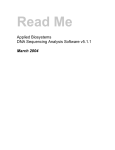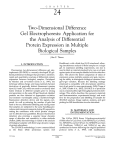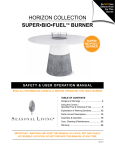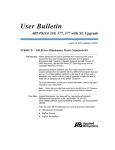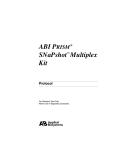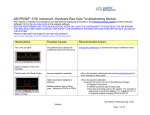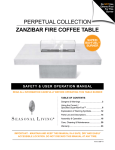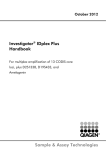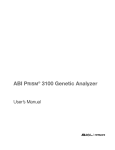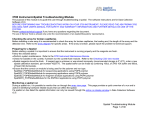Download Multiplex SNaPshot UB - Thermo Fisher Scientific
Transcript
User Bulletin Applied Biosystems 3730/3730xl DNA Analyzers and 3130/3130xl Genetic Analyzers July 2005 SUBJECT: Using the SNaPshot® Multiplex System with the POP-7™ Polymer on Applied Biosystems 3730/3730xl DNA Analyzers and 3130/3130xl Genetic Analyzers In This User Bulletin This user bulletin includes the following topics: Overview . . . . . . . . . . . . . . . . . . . . . . . . . . . . . . . . . . . . . . . . . . . . . . 2 The SNaPshot Multiplex System with POP-7 Polymer Protocol . . . . . . . . . . . . . . . . . . . . . . . . . . . . . . 2 Protocol Validation and Testing. . . . . . . . . . . . . . . . . . . . . . . . . 2 Customer Acknowledgement. . . . . . . . . . . . . . . . . . . . . . . . . . . 2 SNaPshot Multiplexing on the Applied Biosystems 3730/3730xl DNA Analyzers and 3130/3130xl Genetic Analyzers . . . . . . . . . . . . 3 The SNaPshot Multiplex Kit . . . . . . . . . . . . . . . . . . . . . . . . . . . 3 The SNaPshot Multiplex System. . . . . . . . . . . . . . . . . . . . . . . . 3 Preparing the 3730/3730xl and 3130/3130xl Analyzers for Any5Dye and E5 Dye Set Runs. . . . . . . . . . . . . . . . . . . . . . . . . 4 Creating the Spectral Calibration Protocol . . . . . . . . . . . . . . . . 5 Correcting Spectral Calibration Failures . . . . . . . . . . . . . . . . . . 7 Creating Run Modules. . . . . . . . . . . . . . . . . . . . . . . . . . . . . . . . 8 Creating Regular Run Protocols . . . . . . . . . . . . . . . . . . . . . . . . 9 Rapid Assessment of SNaPshot Primers for Multiplexing with the SNaPshot Primer Focus Kit . . . . . . . . . . . . . . . . . . . . 11 Data Analysis with GeneMapper Software v3.7 or higher . . . 12 Sizing Differences . . . . . . . . . . . . . . . . . . . . . . . . . . . . . . . . . . 13 Conclusion . . . . . . . . . . . . . . . . . . . . . . . . . . . . . . . . . . . . . . . . 13 Appendix A . . . . . . . . . . . . . . . . . . . . . . . . . . . . . . . . . . . . . . . . . . . 14 Appendix B . . . . . . . . . . . . . . . . . . . . . . . . . . . . . . . . . . . . . . . . . . . 15 Appendix C . . . . . . . . . . . . . . . . . . . . . . . . . . . . . . . . . . . . . . . . . . . 16 DRAFT July 19, 2005 10:07 am, Multiplex SNaPshot UB.fm Applied Biosystems 3730/3730xl DNA Analyzers and 3130/3130xl Genetic Analyzers Overview The SNaPshot Multiplex System with POP-7 Polymer Protocol This user bulletin provides a detailed protocol for running the SNaPshot® Multiplex system with POP-7 polymer on the Applied Biosystems 3730/3730xl DNA Analyzers and the Applied Biosystems 3130/3130xl Genetic Analyzers. Protocol Validation and Testing Applied Biosystems has not performed optimization or testing to validate or support the use of the application described in this user bulletin on the 3730/3730xl DNA analyzers or the 3130/3130xl Genetic analyzers. However, several Applied Biosystems customers are currently running the SNaPshot Multiplex system and POP-7 Polymer as described in this protocol. If you want additional information about these applications, contact Applied Biosystems Technical Support. See “Appendix A” on page 14 for a table of run configurations using the SNaPshot Multiplex system on various Applied Biosystems instruments. Customer Acknowledgement We would like to acknowledge Dr. Sylvie Quiniou and Mary Duke at USDA-ARS, Mid-South Area Genomics Laboratory, Catfish Genetics Research Unit, Stoneville, MS (http://www.ars.usda.gov) for the protocols and data supplied for this User Bulletin as well as for the BAC Fingerprinting on 3730/3730xl Analyzers Application Note (PN 107AP04-01). Dr. Quiniou, a microbiologist at the Catfish Genetics Research Unit, which focuses on the genetic improvement of catfish in areas such as growth and disease resistance, has implemented the BAC fingerprinting application using the SNaPshot reagents-based chemistry system on the 3730 instrument as part of their research project. We would also like to acknowledge Mike Zianni and his staff at the Plant Microbe Genomics Facility, Ohio State University (www.biosci.ohio-state.edu/~pmgf), a core laboratory that provides DNA sequencing and genotyping services to the university and other research facilities in the state, for the protocols and data they supplied in this User Bulletin. 2 DRAFT July 19, 2005 10:07 am, Multiplex SNaPshot UB.fm User Bulletin SNaPshot Multiplexing on the Applied Biosystems 3730/3730xl DNA Analyzers and 3130/3130xl Genetic Analyzers SNaPshot Multiplexing on the Applied Biosystems 3730/3730xl DNA Analyzers and 3130/3130xl Genetic Analyzers The SNaPshot Multiplex Kit The SNaPshot® Multiplex Kit, based on a single nucleotide primer extension (Figure 1), is part of a versatile system that can be used for a variety of applications: • • • • • Low-to-medium throughput linkage and association studies Single locus fragment analysis BAC fingerprinting Single Nucleotide Polymorphism (SNP) genotyping Bacterial classification Figure 1 Single nucleotide primer extension The SNaPshot reagent-based chemistry is based on the dideoxy single-base extension of an unlabeled oligonucleotide primer or primers. This method makes for easy conversion from manual PCR detection methods such as ethidium bromide gelbased chemistries. The SNaPshot Multiplex System The SNaPshot Multiplex system consists of the following: • SNaPshot® Multiplex Kit including the master mix with fluorescently labeled ddNTPs and enzymes • GeneScan™ 120 LIZ® Size Standard • GeneMapper® Software v3.7 or higher • Capillary electrophoresis instruments See “Appendix B” on page 15 for a list of materials and part numbers. Using the SNaPshot® Multiplex System with the POP-7™ Polymer on Applied Biosystems 3730/3730xl DNA Analyzers and 3130/3130xl Genetic Analyzers 3 DRAFT July 19, 2005 10:07 am, Multiplex SNaPshot UB.fm Applied Biosystems 3730/3730xl DNA Analyzers and 3130/3130xl Genetic Analyzers Preparing the 3730/3730xl and 3130/3130xl Analyzers for Any5Dye and E5 Dye Set Runs Before beginning the setup procedures necessary for running SNaPshot Kit samples on the 3730/3730xl or 3130/3130xl analyzers with POP-7 polymer, complete the following steps: • Install GeneMapper Software v3.7 or higher. Your Applied Biosystems service engineer or field application specialist can provide instructions for software installation, if needed. • Create protocols for the Spectral Calibration and Regular run types with the Any5Dye dye set for running on 3730/3730xl or with the E5 dye set for running on 3130/3130xl. (See “Creating the Spectral Calibration Protocol” on page 5.) • Create a new Run Module with GeneMapper36_POP7 settings for running on 3730/3730xl or with FragmentAnalysis36_POP7 settings for running on 3130/3130xl. (See “Creating Run Modules” on page 8.) IMPORTANT! The GeneMapper Software must be installed on the instrument computer. Additional information can be found in the Applied Biosystems 3730/3730xl DNA Analyzers User Guide for use with Data Collection Software v2.0 (PN 4347118) and the Applied Biosystems 3130/3130/xl Genetic Analyzers Getting Started Guide (PN 4352715). Both documents can be ordered from the Applied Biosystems Web site at www.appliedbiosystems.com. 4 DRAFT July 19, 2005 10:07 am, Multiplex SNaPshot UB.fm User Bulletin SNaPshot Multiplexing on the Applied Biosystems 3730/3730xl DNA Analyzers and 3130/3130xl Genetic Analyzers Creating the Spectral Calibration Protocol Create the spectral calibration protocol before you process the run. This protocol uses the Any5Dye dye set with the 3730/3730xl analyzer, which is available only with Data Collection Software v2.0 or higher, or the E5 dye set with the 3130/3130xl analyzer, which is available with Data Collection Software v3.0. To create a spectral calibration protocol: 1. In the left-hand navigation window of the Data Collection software, select Protocol Manager. 2. In the Instrument Protocols area, select New to open the Protocol Editor window. Dye Set setting for the 3730/3730xl DNA Analyzer Run Module setting for the 3730/3730xl DNA Analyzer wind Figure 2 A spectral protocol in Protocol Manager, using the Any5Dye dye set and the Spect36_MtxStd_POP7_1 run module on the 3730/3730xl DNA Analyzer Dye Set setting for the 3130/3130xl Genetic Analyzer Run Module setting for the 3130/3130xl Genetic Analyzer Figure 3 A spectral protocol in Protocol Manager, using the E5 dye set and the Spect36_POP7_1 run module on the 3130/3130xl Genetic Analyzer Using the SNaPshot® Multiplex System with the POP-7™ Polymer on Applied Biosystems 3730/3730xl DNA Analyzers and 3130/3130xl Genetic Analyzers 5 DRAFT July 19, 2005 10:07 am, Multiplex SNaPshot UB.fm Applied Biosystems 3730/3730xl DNA Analyzers and 3130/3130xl Genetic Analyzers 3. Enter a name for your spectral calibration in the Name field (E5_Spectral in the example shown in Figure 3 on page 5). Use Table 1 below to make the appropriate selection for your instrument from each field listed. Note: Entering information in the Description field is optional Table 1 Protocol Editor selections for the 3730/3730xl and the 3130/3130xl analyzers Field 3730/3730xl Setting 3130/3130xl Setting Type Spectral Spectral Dye Set Any5Dye E5 Polymer POP7 POP7 Array Length 36 36 Chemistry Matrix Standard Matrix Standard Run Module Spect36_MtxStd_POP7_1 Spect36_POP7_1 4. Select Edit Parameter at the bottom of the Protocol Editor window to open the Edit Spectral Params window. Figure 4 The Edit Spectral Params window – For the 3730/3730xl DNA analyzers, the Matrix Condition Number Bound can be set to 2.5 (minimum) and 4.5 (maximum). The Minimum Quality Score should not be lower than 0.9. A minimum quality score of 0.95 is common. – For the 3130/3130xl Genetic analyzers, use the default condition numbers. 5. Click OK to save any changes to the parameters and click OK again to save the newly created Spectral Protocol. 6. Prepare a spectral calibration matrix plate by following the protocol provided with the Matrix Standard Set DS-02 Kit (PN 4323014 for the 3130 series systems and PN 4322849 for the 3730 series systems). PN 4322849 is formulated for use with the ABI PRISM® 3700 DNA Analyzer, but it can also be used on the 3730/3730xl instrument. 6 DRAFT July 19, 2005 10:07 am, Multiplex SNaPshot UB.fm User Bulletin SNaPshot Multiplexing on the Applied Biosystems 3730/3730xl DNA Analyzers and 3130/3130xl Genetic Analyzers 7. Follow instructions in the instrument user manual to perform a spectral calibration run. When the spectral calibration run is complete and passes (>90% of passing caps), the instrument is ready to run SNaPshot samples. (See “Creating Regular Run Protocols” on page 9.) If the spectral calibration fails, check the Spectral Calibration Run Log for the error source. Any errors with spectral calibration in each capillary are also detailed in the log file. The file is located at the following address: E://AppliedBiosystems/UDC/DataCollection/Data/ga3x30/Instrument Number/SpectralCalTmpFiles/Any5Dye/SpectralCalResult-Run Correcting Spectral Calibration Failures If the spectral calibration failure is due to matrix standard peaks being too strong (i.e., if pull-up or pull-down peaks are visible (Figure 5), dilute the standards 2:1 with Hi-Di™ Formamide and perform spectral calibration again. CHEMICAL HAZARD. Hi-Di Formamide. Exposure causes eye, skin, and respiratory tract irritation. It is a possible developmental and birth defect hazard. Read the MSDS, and follow the handling instructions. Wear appropriate protective eyewear, clothing, and gloves. Figure 5 Failed spectral calibration showing pull-up and pull-down peaks Using the SNaPshot® Multiplex System with the POP-7™ Polymer on Applied Biosystems 3730/3730xl DNA Analyzers and 3130/3130xl Genetic Analyzers 7 DRAFT July 19, 2005 10:07 am, Multiplex SNaPshot UB.fm Applied Biosystems 3730/3730xl DNA Analyzers and 3130/3130xl Genetic Analyzers If the spectral calibration failure is due to the condition number not being within the designated range, adjust the Matrix Condition Number Bound ‡ by following the steps below. Note: The capillary condition number for each capillary is found in the Spectral Calibration Run Log. 1. Determine the average condition number for the array by selecting several wells. 2. Adjust the matrix condition number bounds to approximately ±1.5 of the average condition number. 3. Run spectral calibration immediately after you correct the reason for failure. Make new matrix standards or, if the elapsed time between the two spectral runs is less than one hour, use the same matrix standards. Creating Run Modules To create a Run Module: 1. Launch the Data Collection Software v3.0 for the 3130 Series Systems or v2.0 or higher for the 3730 Series Systems. 2. Select Module Manager and then New to open the Run Module Editor window. Template setting for the 3730/3730xl DNA analyzer Figure 6 The Run Module Editor window using the GeneMapper36_POP7 template on the 3730/3730xl DNA analyzer ‡ This parameter is adjusted only if the spectral calibration failed and the condition number is not within the designated range. The capillary condition number is located in the Spectral Viewer. 8 DRAFT July 19, 2005 10:07 am, Multiplex SNaPshot UB.fm User Bulletin SNaPshot Multiplexing on the Applied Biosystems 3730/3730xl DNA Analyzers and 3130/3130xl Genetic Analyzers Template setting for the 3130/3130xl Genetic analyzers Figure 7 The Run Module Editor window using the FragmentAnalysis36_POP7 template on the 3130/3130xl Genetic analyzer 3. Fill in the appropriate fields in the Run Module setting fields, as follows: Field 3730/3730xl Instrument Setting 3130/3130xl Instrument Setting Name E5 Chemistry (for example) E5 Chemistry (for example) Type Regular Regular Template GeneMapper36_POP7 FragmentAnalysis36_POP7 Note: For SNaPshot reagent-based chemistry, if the desired fragments appear before the default time of 1,200 seconds, the Run_Time may be shortened. The Plant Microbe Genomics Facility at Ohio State University shortened the Run_Time to 600 seconds on a 36-cm capillary array. Creating Regular Run Protocols To create Regular Run Protocols, follow theses steps: 1. Open the Data Collection software and select Protocol Manager. 2. Click the New button in the Instrument Protocols area. The Protocol Editor window opens (see Figure 8 and Figure 9 on page 10). Using the SNaPshot® Multiplex System with the POP-7™ Polymer on Applied Biosystems 3730/3730xl DNA Analyzers and 3130/3130xl Genetic Analyzers 9 DRAFT July 19, 2005 10:07 am, Multiplex SNaPshot UB.fm Applied Biosystems 3730/3730xl DNA Analyzers and 3130/3130xl Genetic Analyzers Dye Set setting for the 3730/3730xl DNA Analyzer Figure 8 The Protocol Editor window in the Data Collection software on the 3730/3730xl DNA analyzer Dye Set setting for the 3130/3130xl Genetic Analyzer Figure 9 The Protocol Editor window in the Data Collection software on the 3130/3130xl Genetic analyzer 3. Enter the name of your new instrument protocol (i.e., E5_Chemistry) in the Name field. Entering information in the Description field is optional. 4. Select Regular in the Type field. 5. In the Run Module field, select the Run Module created above (i.e. E5_Chemistry) from the drop-down menu. 6. In the Dye Set field, select Any5Dye for running on the 3730/3730xl analyzer or E5 for running on the 3130/3130xl. Then click OK. 10 DRAFT July 19, 2005 10:07 am, Multiplex SNaPshot UB.fm User Bulletin SNaPshot Multiplexing on the Applied Biosystems 3730/3730xl DNA Analyzers and 3130/3130xl Genetic Analyzers 7. Set up a sample sheet. Refer to instructions in the Applied Biosystems 3130/3130xl Genetic Analyzers Getting Started Guide (PN 4352715) or the Applied Biosystems 3730/3730xl DNA Analyzer Getting Started Guide (PN 4359476). 8. Run the sample plates and analyze the results with GeneMapper Software v3.7 or higher for simultaneous sizing and genotyping (see Figure 10). Figure 10 shows a multiplexed SNaPshot Kit reaction using POP-7 polymer and a 36-cm capillary array on the Applied Biosystems 3730 DNA analyzer. The data was analyzed by GeneMapper Software v3.7. The color bars represent bins used for allele calling. The GS120LIZ size standard was used for sizing.The analyzed data can then be exported in a tab-delimited Microsoft Excel® Software spreadsheet. Figure 10 Multiplexed SNaPshot Kit reaction using POP-7 polymer and a 36-cm array on the 3730 DNA analyzer Rapid Assessment of SNaPshot Primers for Multiplexing with the SNaPshot Primer Focus Kit During the course of SNP validation, users often encounter two major obstacles: • Determining which combination of SNP loci to multiplex • Establishing tools to enable automatic data analysis Using the SNaPshot Primer Focus kit enables rapid assessment of potential oligonucleotides used in the single-base extention step designed for a project. The chemistry uses single-base extension of a primer in the presence of fluorescentlylabeled dideoxynucleotides, but without the presence of DNA template. You can preview all potential full length products (the four possible alleles are represented by four colors: A=green, C=black, G=blue, T=red), and you can calculate the mobility rate for each allele using this kit. Once the data is generated, the optimal combination of SNP markers are identified for multiplexing. In Figure 11 and Figure 12 on page 12, Focus kit data from a 3130xl Genetic Analyzer demonstrates the mobility of a 32-mer oligonucleotide by itself and in combination with a 36-mer oligonucleotide. The data shows that sufficient separation is obtained from the 4-nucleotide length difference between the two primers. Using the SNaPshot® Multiplex System with the POP-7™ Polymer on Applied Biosystems 3730/3730xl DNA Analyzers and 3130/3130xl Genetic Analyzers 11 DRAFT July 19, 2005 10:07 am, Multiplex SNaPshot UB.fm Applied Biosystems 3730/3730xl DNA Analyzers and 3130/3130xl Genetic Analyzers dR6G dR110 dTAMRA™ dROX™ Figure 11 Primer Focus® Kit samples run with POP-7 polymer on a 3130xl Genetic Analyzer with a 36-cm capillary array. Mobility of a 32-mer oligonucleotide primer focus product is shown for each of the 4 dyes: dR110 (blue), dR6G (green), dTAMRA™ (yellow) and dROX™ (red). Figure 12 Multiplexed Primer Focus Kit samples run with POP-7 polymer on a 3130xl Genetic Analyzer with a 36-cm capillary array. Mobility of two primer focus oligonucleotide products, the 32-mer shown in Figure 11 and a 36-mer when mixed in equal amounts and run in the same capillary. Data Analysis with GeneMapper Software v3.7 or higher The workflow for analysis of data in GeneMapper software involves the following: • • • • Addition of appropriate samples to a new project Setting up analysis parameters Running the analysis Reviewing the results of the analyzed project The Autoanalysis Option in the Data Collection software run on the 3130/3130xl Genetic Analyzers and the 3730/3730xl DNA Analyzers automates all steps from addition of samples to running the analysis; the user only reviews the analyzed results. GeneMapper software contains a SNaPshot Kit specific analysis method designed to recognize and analyze SNaPshot Kit data. Once the mobility of the extended products has been determined, bins representing the actual allele size range and dye color for a given SNP can be assigned. The software uses bins to make the actual allele call (see Figure 10 on page 11). Once these bins have been set up, the software automatically assigns genotypes to samples at the end of the analysis. These bins are saved and reapplied automatically to all subsequent projects that use the same set of SNPs enabling a streamlined workflow from sample loading, data collection, data analysis and genotype results generation. Please refer to the GeneMapper® Software v3.7 User Guide (PN 4359413) for more detailed information on data analysis. 12 DRAFT July 19, 2005 10:07 am, Multiplex SNaPshot UB.fm User Bulletin SNaPshot Multiplexing on the Applied Biosystems 3730/3730xl DNA Analyzers and 3130/3130xl Genetic Analyzers Sizing Differences In fragment analysis, a fragment is assigned a size based on its relative mobility to size standards as it migrates through the polymer. Any change in run conditions, such as capillary array length or polymer type, affects fragment mobility. Sizing differences resulting from mobility changes between various types of polymer are more apparent for sequences < 50 base pairs (bp). Due to the nature of the polymer, smaller fragments (< 50 bp) run on POP-7™ polymer on the 3130/xl Genetic Analyzers and on the 3730/xl DNA Analyzers may have slightly different mobilities. To avoid sizing inconsistency with smaller fragments, Applied Biosystems recommends that genotyping projects be started and completed on the same instrument, using consistent run conditions. Avoid inconsistencies by creating single-base extention primers no shorter than 25 nucleotides (nts). In addition, the spacing should be at least 6-8 nts for primers that are less than 30 nts and 4-6 nts for primers that are greater than 30 nts. Alternatively, genotypes can be standardized to one platform by running representative alleles across all platforms and creating instrument-specific bin sets with standardized bin names in GeneMapper Software v3.7 or higher. Conclusion In addition to multiplexing, the SNaPshot Multiplex Kit can also be used for the rapidly expanding field of fragment analysis and SNP genotyping. Researchers in these areas increasingly look for ways to improve throughput and cost-effectiveness without sacrificing data quality. One solution is to leverage the flexibility of the Applied Biosystems 3730/3730xl DNA analyzers and the 3130/3130xl Genetic analyzers to accommodate genotyping applications designed for the SNaPshot Multiplex Kit. For more information, please contact your Sales Representative, Field Application Specialist, or Technical Support. Using the SNaPshot® Multiplex System with the POP-7™ Polymer on Applied Biosystems 3730/3730xl DNA Analyzers and 3130/3130xl Genetic Analyzers 13 DRAFT July 19, 2005 10:07 am, Multiplex SNaPshot UB.fm Applied Biosystems 3730/3730xl DNA Analyzers and 3130/3130xl Genetic Analyzers Appendix A Throughput Results Using the SNaPshot Multiplex System on the Applied Biosystems 3730/3730xl DNA Analyzers, 3130/3130xl Genetic Analyzers, and 3100 Analyzers Instrument Number of Capillaries Run Time (min) Number of Runs/24 hr Number of Genotypes/Run Number of Genotypes/Day 3730 (36-cm, POP-7) 48 33 43 10 20,640 3730xl (36-cm POP-7) 96 33 43 10 41,280 3130 (36-cm, POP-7) 4 35 41 10 1,640 3130 (22-cm, POP-4™) 4 20 72 10 2,880 3100-Avant (36-cm, POP-4) 4 24 60 10 2,400 3100-Avant (22-cm POP-4) 4 20 72 10 2,880 3130xl (36cm, POP-7) 16 35 41 10 6,560 3130xl (22-cm POP-4) 16 20 72 10 11,520 3100 (36-cm array POP-4) 16 24 60 10 9,600 3100 (22-cm array POP-4) 16 20 72 10 11,520 (array & polymer) 14 DRAFT July 19, 2005 10:07 am, Multiplex SNaPshot UB.fm User Bulletin Appendix B Appendix B Ordering Information for Materials Description Comments PN ABI PRISM® SNaPshot® Multiplex Kit 5,000 rxns 4323163 ABI PRISM® SNaPshot® Multiplex Kit with protocol 1,000 rxns 4323154 ABI PRISM® SNaPshot® Multiplex Kit with protocol 100 rxns 4323151 SNaPshot® Primer Focus® Kit 100 rxns 4329538 3730/3730xl DNA Analyzer User’s Guide v2.0 or higher 4347118 Applied Biosystems 3130/3130xl Genetic Analyzers Getting Started Guide 4352715 GeneMapper® Software v3.7 Initial License 4363138 GeneMapper® Software v3.7 Additional License 4363137 GeneScan™ 120 LIZ® Size Standard 4324287 48 capillary × 36 cm Capillary Array (3730) 4331247 96 capillary × 36 cm Capillary Array (3730xl) 4331244 36cm Applied Biosystems 3130 and 3100-Avant Capillary Array 4333464 36cm Applied Biosystems 3130xl and 3100 Capillary Array 4315931 Hi-Di™ Formamide 4311320 Matrix Standard Set DS-02 (dR110, dR6G, dTAMRA™, dROX™, LIZ® Dyes) 3700 DNA Analyzer 4322849 Matrix Standard Set DS-02 (dR110, dR6G, dTAMRA™, dROX™, LIZ® Dyes) 3130/3130xl Genetic Analyzers 4323014 POP-7™ Polymer for Applied Biosystems 3130 and 3130xl Genetic Analyzers 7 mL 4352759 POP-7™ Polymer for 3730/3730xl DNA Analyzers, Box of 15, 25 mL Bottles 15 bottles/box 420 mL 4335612 Using the SNaPshot® Multiplex System with the POP-7™ Polymer on Applied Biosystems 3730/3730xl DNA Analyzers and 3130/3130xl Genetic Analyzers 15 DRAFT July 19, 2005 10:07 am, Multiplex SNaPshot UB.fm Applied Biosystems 3730/3730xl DNA Analyzers and 3130/3130xl Genetic Analyzers Appendix C SNaPshot Reference Documents Title Part Number ABI PRISM® SNaPshot™ ddNTP Primer Extension Kit Protocol 4312665 ABI PRISM® SNaPshot™ Multiplex Kit Protocol 4323357 ABI PRISM® SNaPshot™ Multiplex Kit Quick Reference Card 4323975 BAC Fingerprinting on the Applied Biosystems 3730/3730xl DNA Analyzer SNaPshot® Multiplex System Application Note 107AP04-01 GeneMapper® Software Version 4.0 SNaPshot Kit Analysis Getting Started Guide 4363078 GeneScan Analysis Software: Genetic Analysis: Product Bulletin 107PB05-01 Using ABI PRISM® Genotyper® Software Version 3.7 with the SNaPshot™ Multiplex Kits ABI PRISM® Genotyper® Software User Bulletin 4326549 16 DRAFT July 19, 2005 10:07 am, Multiplex SNaPshot UB.fm User Bulletin Using the SNaPshot® Multiplex System with the POP-7™ Polymer on Applied Biosystems 3730/3730xl DNA Analyzers and 3130/3130xl Genetic Analyzers 17 DRAFT July 19, 2005 10:07 am, Multiplex SNaPshot UB.fm Applied Biosystems 3730/3730xl DNA Analyzers and 3130/3130xl Genetic Analyzers 18 DRAFT July 19, 2005 10:07 am, Multiplex SNaPshot UB.fm User Bulletin © Copyright 2005, 2010 Applied Biosystems. All rights reserved. For Research Use Only. Not for use in diagnostic procedures. Information in this document is subject to change without notice. Applied Biosystems assumes no responsibility for any errors that may appear in this document. This document is believed to be complete and accurate at the time of publication. In no event shall Applied Biosystems be liable for incidental, special, multiple, or consequential damages in connection with or arising from the use of this document. SNaPshot Kits For Research Use Only. Not for use in diagnostic procedures. NOTICE TO PURCHASER: LIMITED LICENSE The purchase price of the ABI PRISM SNaPshot Multiplex Kit includes a limited, nontransferable license under U.S. patents or their foreign counterparts, to use only this amount of the product for DNA Sequencing and related processes described in said patent solely for the research and development activities of the purchaser. No license under these patents to use the PCR Process is conveyed expressly or by implication to the purchaser by the purchase of this product. A license to use the PCR Process for certain research and development activities accompanies the purchase of certain reagents from licensed suppliers such as Applied Biosystems when used in conjunction with an Authorized Thermal Cycler, or is available from Applied Biosystems. Further information on purchasing licenses to practice the PCR Process may be obtained by contacting the Director of Licensing at Applied Biosystems, 850 Lincoln Centre Drive, Foster City, California 94404, or at Roche Molecular Systems, Inc., 1145 Atlantic Avenue, Alameda, California 94501. NOTICE TO PURCHASER: LIMITED LICENSE This kit (reagent) is sold pursuant to a limited sublicense from Amersham International plc under one or more U.S. Patent Nos. 5,498,523, 5,614,365, and corresponding foreign patents and patent applications. The purchase of this kit (reagent) includes a limited non-exclusive sublicense (without the right to resell, repackage, or further sublicense) under such patent rights to use this reagent for DNA sequencing or fragment length analysis solely with an Applied Biosystems commercial automated sequencing machine or other authorized DNA sequencing machines that have been authorized for such use by Applied Biosystems, or for manual DNA sequencing. No license is hereby granted for the use of this kit, or the reagents therein in any other automated sequencing machine. Such sublicense is granted solely for research and other uses that are not unlawful. No other license is granted expressly, impliedly, or by estoppel. For information concerning the availability of additional license to practice the patented methodologies, contact: Amersham Life Science, Inc., Vice President, Regulatory Affairs, P.O. Box 22400, Cleveland, Ohio 44122. Patents are pending in countries outside the United States. End User License The purchase price of this product includes a limited, non-transferable license under U.S. Patent Nos. 5,888,819, 6,004,744 and their foreign counterparts owned by Orchid Biocomputer, Inc. of Princeton, New Jersey, to perform 24, 100, or 1000 Genotypes (For purposes of this End User License, Genotype means the detection or quantification of an individual SNP within a single sample.) solely for the detection and analysis of SNPs in samples for research purposes only and only on automated electrophoresis nucleotide sequencers. This license specifically excludes performing services for a third party and any and all medical diagnostic or therapeutic uses. Information about purchasing licenses to practice primer extension technology covered by Orchid BioSciences, Inc. patents for any other use may be obtained by contacting the Senior Director for Business Development at Orchid BioSciences, Inc. Princeton, New Jersey, U.S.A. at (609) 750-2200. 3730/3730xl and 3130/3130xl Analyzers NOTICE TO PURCHASER: This instrument is Authorized for use in DNA sequencing and fragment analysis. This authorization is included in the purchase price of this instrument and corresponds to the up-front fee component of a license under process claims of U.S. patents and under all process claims for DNA sequence and fragment analysis of U.S. patents now or hereafter owned or licensable by Applied Biosystems for which an Authorization is required, and under corresponding process claims in foreign counterparts of the foregoing for which an Authorization is required. The running royalty component of licenses may be purchased from Applied Biosystems or obtained by using Authorized reagents purchased from Authorized suppliers in accordance with the label rights accompanying such reagents. Purchase of this instrument does not itself convey to the purchaser a complete license or right to perform the above processes. This instrument is also licensed under U.S. patents and apparatus and system claims in foreign counterparts thereof. No rights are granted expressly, by implication or by estoppel under composition claims or under other process or system claims owned or licensable by Applied Biosystems. For more information regarding licenses, please contact the Director of Licensing at Applied Biosystems, 850 Lincoln Centre Drive, Foster City, California 94404, USA. NOTICE TO PURCHASER: The purchase price of the Applied Biosystems 3730 and 3730xl DNA Analyzers and 3130 and 3130xl Genetic Analyzers includes a grant of a limited, nontransferable license under U.S. patents and method claims of its foreign counterparts, and element claims of its foreign counterparts, to use this particular instrument for electrophoresis methods employing fluorescence as a means of detection. No other licenses or rights are hereby conveyed either expressly, by implication, or estoppel including, but not limited to, any claims to a composition. The Applied Biosystems 3730 and 3730xl DNA Analyzers and 3130 and 3130xl Genetic Analyzers s include patented technology licensed from Hitachi, Ltd. as part of a strategic partnership between Applied Biosystems and Hitachi, Ltd., as well as patented technology of Applied Biosystems. TRADEMARKS: Applied Biosystems, ABI PRISM, GeneMapper, LIZ, and SNaPshot are registered trademarks and AB (Design), Applera, GeneScan, Hi-Di, POP-4, POP-7, ROX, and TAMRA are trademarks of Applied Biosystems or its subsidiaries in the U.S. and/or certain other countries. All other trademarks are the sole property of their respective owners. 19 DRAFT July 19, 2005 9:15 am, Multiplex SNaPshot UB.fm User Bulletin Refer to page 19 for Licensing and Trademark information. Worldwide Sales and Support Applied Biosystems vast distribution and service network, composed of highly trained support and applications personnel, reaches 150 countries on six continents. For sales office locations and technical support, please call our local office or refer to our Web site at www.appliedbiosystems.com. Applied Biosystems is committed to providing the world’s leading technology and information for life scientists. Headquarters 850 Lincoln Centre Drive Foster City, CA 94404 USA Phone: +1 650.638.5800 Toll Free (In North America): +1 800.345.5224 Fax: +1 650.638.5884 06/2010 www.appliedbiosystems.com Part Number 4367258 Rev. B






















